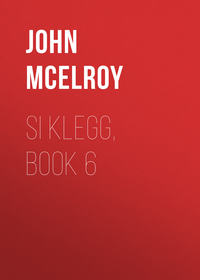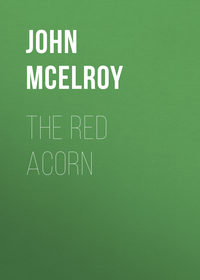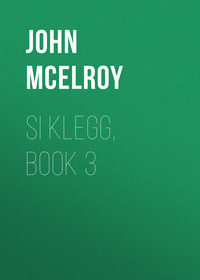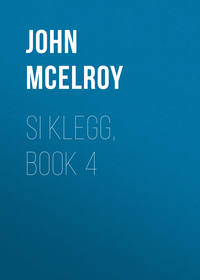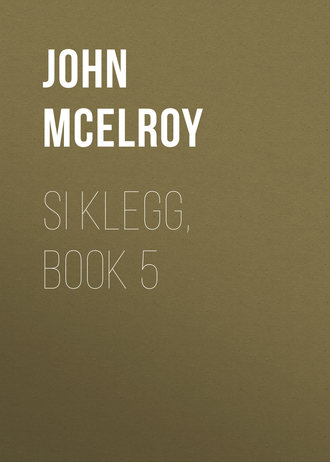 полная версия
полная версияSi Klegg, Book 5
"It must be very nice, Maria," said Arabella, with a show of cordiality, but which Maria interpreted as an attempt to patronize, "to have your brother back home with you again."
"It certainly will be. Miss Widgeon," answered Maria, with strictly "company manners." "One who has never had a brother exposed to the constant dangers of army life can hardly understand how glad we all feel to have Si snatched from the very jaws of death and brung back to us."
"That's a little love-tap that'll settle several scores with Miss Frills," Maria chuckled to herself. "Partickerly the airs she put on over all us girls when she was running around to singing-school and church with that Second Lieutenant, who ain't got across the Ohio River yet, and I don't believe he intends to. Sol Pringle tells me all his letters to her are postmarked Jeffersonville."
Arabella took no seeming notice of the shot, but came back sweetly:
"I am awfully glad that your brother was not hurt so badly as at first reported. He couldn't be, and be able to come home now. These papers do magnify everything so, and make no end of fuss over little things as well as big ones, I was very much alarmed at first, for fear Si might be really badly hurt."
This was too much for Maria. Her company manners slid off like a drop of water from a cabbage leaf, and she answered hotly:
"I'd have you know. Miss Widgeon, the papers don't magnify the matter. They don't make a fuss over nothing. They don't begin to tell all the truth. None o' them can. My brother was nearer dead than any man who ever lived. Nothing but the favor of God and Klegg grit pulled him through. It'd killed a whole house full o' Randy Widgeons or that Second Lieutenant. I remember Randy Widgeon turning pale and a'most fainting when he run a fish-hook in his finger. If it ain't nothing, why don't Randy Widgeon go down there a little while, with the rest o' the boys, and do his share?"
"My brother disbelieves in the constitutionality of this war, and denies that we have any right to take away other people's slaves," said Arabella loftily. "I s'pose he's a right to his opinions."
"A poor excuse's better'n none," retorted Maria. "I noticed that he didn't turn out last Summer to keep John Morgan from stealing our people's horses, and robbing their stores and houses. S'pose he thought it unconstitutional to let a nasty rebel gorilla shoot at him. It's very convenient to have opinions to keep you from doin' things that you're afraid to do."
The dialog was approaching the volcanic stage, when a poorly-dressed, sad-faced woman, with a babe in her arms, edged through the crowd to Maria, and said timidly, for she had never been accounted by the Kleggs as in their set:
"Miss Maria, I don't s'pose you know me, but I do so want to git a chance to speak to your pap as soon as he gets here, and before all these people gits hold of him. Mebbe he's found out something about poor Jim. I can't believe that Jim was killed, and I keep hopin' that he got away somehow, and is in one o' them hospitals. Mebbe your pap knows. I know you think Jim was bad and rough, but he was mighty good to me, and he's all that I had. I'm nearly dead to hear about him, but I can't write, nor kin Jim. I've bin tryin' to make up my mind to come over to your house, and ax you to write for me."
"Of course, you can, you poor, dear woman," said Maria, her mood changing at once from fierceness to loving pity. "You shall be the first one to speak to Pap and Si after me. Why didn't you come over to see us long ago. We'd only bin too glad to see you, and do all we could for you. Yes, I know you.
"You're Polly Blagdon, and live down by the sawmill, where your husband used to work. You look tired and weak carrying that big baby. Let me hold him awhile and rest you. Sit down there on that box. I'll make Sol Pringle clear it off for you."
Arabella curled her nose, at seeing Maria take the unwashed baby in her arms, to the imminent danger of her best gown, but Maria did not notice this, and was all loving attention to the baby and its mother.
It seemed an age until the whistle of the locomotive was heard. The engine had to stop to take water at the creek, several hundred yards from the station, and Maria's impatience to see Si and be the first to speak to him could not brook the delay.
"Come along, Mrs. Blagdon," she called, and with the baby still in her arms, she sped down the cinder track to the pumping station, and then along the line of freight cars until she recognized her father's face looking from the caboose, which was still beyond the bridge. She shouted joyously at him.
"Maria's out there, waitin' for us, and she's got a baby in her arms. What do you suppose she thinks we want a baby for?"
"'Spect she's been practicin' on it, so's to take care o' us, Si," said Shorty. "I believe we've been more trouble to your father than we wuz to our mothers when we wuz teethin'."
"I've bin repaid for all, more'n repaid for all," said the Deacon; "especially since I'm once more back home, and out o' the reach o' the Sheriffs o' Tennessee. I'll stay away from Chattanoogy till after the Grand Jury meets down there. If it does its dooty there'll be several bills with Josiah Klegg's name entirely too conspicuous."
"I want to be able to git out to the next covenant meetin', Pap," said Si with a grin, "and hear you confess to the brethren and sisters all that you've bin up to down at Chattanoogy."
"Well, you won't git there," said the Deacon decisively. "We don't allow nobody in there who hain't arrived at the years o' discreetion, which'll keep you out for a long time yit."
The train pulled over across the bridge, and handing the baby to its mother, Maria sprang in, to recoil in astonishment at the sight of Annabel's blushing face.
"You mean thing," said Maria, "to steal a march on me this way, when I wanted to be the first to see Si. Where in the world did you come from, and how did you find out he was comin' home on this train? Si, you didn't let her know before you did us, did you?"
She was rent by the first spasm of womanly jealousy that any other woman should come between her brother and his mother and sisters.
"Don't be cross, Maria," pleaded Annabel. "I didn't know nothin' of it. You know I've been down to see the Robinses, and intended to stay till tomorrer, but something moved me to come home today, and I just happened to take this train. I really didn't know. Yet," and the instinctive rights of her womanhood and her future relations with Si asserted themselves to her own wonderment, "I had what the preachers call an inward promptin', which I felt it my dooty to obey, and I now think it came from God. You know I ought to be with Si as soon as anybody," and she hid her face in her hands in maidenly confusion.
"Of course you ought, you dear thing," said Maria, her own womanhood overcoming her momentary pique. "It was hateful o' me to speak that way to you."
And she kissed Annabel effusively, though a little deadness still weighed at her heart over being supplanted, even by the girl she liked best in all the world after her own sister.
If the young folks had not been so engaged in their own affairs they would have seen the Deacon furtively undoing his leathern pocket-book and slipping a greenback into the weeping Mrs. Blagdon's hand, as the only consolation he was able to give her.
There were plenty of strong, willing hands to help carry Si from the caboose to the wagon. It was strange how tender and gentle those strong, rough farmers could be in handling a boy who had been stricken down in defense of his country. Annabel's face was as red as a hollyhock over the way that everybody assumed her right to be next to Si, and those who could not get a chance at helping him helped her to a seat in the wagon alongside of him, while the dethroned Maria took her place by her father, as he gathered the reins in his sure hands and started home. Maria had to expend some of the attentions she meant for Si upon Shorty, who received them with awkward confusion.
"Now, don't make no great shakes out o' me, Miss Maria," he pleaded. "I didn't do nothin' partickler, I tell you. I was only along o' Si when he snatched that rebel flag, and I got a little crack on the head, which wouldn't 've amounted to nothin', if I hadn't ketched the fever at Chattanoogy. I'm a'most well, and only come back home to please the Surgeon, who was tired seein' me around."
They found the house a blaze of light, shining kindly from the moment it came in sight, and there was a welcome in Towser's bark which touched Si's heart.
"Even the dogs bark differently up here. Shorty," he said. "It's full and honest, and don't mean no harm. You know that old Towser ain't barkin' to signal some bushwhackers that the Yankees 's comin'. It sounds like real music."
It was Mrs. Klegg's turn to receive a shock when she rushed out to greet her son, and found Annabel by his side. It went deeper to her heart than it had to Maria's; but, then, she had more philosophy, and had foreseen it longer.
After everything had been done, after she had fed them her carefully-prepared dishes, after the boys had been put to bed in the warmed room, and she knew they were sleeping the sound sleep of deep fatigue, she went to her own room to sit down and think it all over. There Maria found her, wiping away her tears, and took her in her arms, and kissed her.
"It's right. It's all right. It's God's ways," said the mother.
"A son's a son till he gets a wife;But a daughter's a daughter all her life."CHAPTER VII. WEEKS OF CONVALESCENCE
PLENTY OF NURSING FROM LOVING, TENDER HANDSWHAT days those were that followed the arrival of the boys home. In Shorty's hard, rough life he had never so much as dreamed of such immaculate housekeeping as Mrs. Klegg's. He had hardly been in speaking distance of such women as Si's mother and sisters. To see these bright, blithe, sweet-speeched women moving about the well-ordered house in busy performance of their duties was a boundless revelation to him. It opened up a world of which he had as little conception as of a fairy realm. For the first time he began to understand things that Si had told him of his home, yet it meant a hundredfold more to him than to Si, for Si had been brought up in that home. Shorty began to regard the Deacon and Si as superior beings, and to stand in such awe of Mrs. Klegg and the girls that he became as tongue-tied as a bashful school-boy in their presence. It amazed him to hear Si, when the girls would teaze him, speak to them as sharply as brothers sometimes will, and just as if they were ordinary mortals.
"Si, you orter to be more careful in talkin' to your sisters," he remonstrated when they were alone.
"You've bin among rough men so long that you don't know how to talk to real ladies."
"O, come off," said Si, petulantly. "What's a-eatin you. You don't know them girls as well as I do. Particularly Maria. She'll run right over you if you let her. She's one o' the best girls that ever breathed, but you've got to keep a tight rein on her. The feller that marries her's got to keep the whip-hand or she'll make him wish that he'd never bin born."
Shorty's heart bounded at the thought of any man having the unspeakable happiness of marrying that peerless creature, and then having the meanness not to let her do precisely as she wanted to.
Both the boys had been long enough in the field to make that plain farm home seem a luxurious palace of rest. The beds were wonders of softness and warmth, from which no unwelcome reveille or cross-grained Orderly-Sergeant aroused them with profane threats of extra duty.
Instead, after peeping cautiously through the door to see that they were awake, the girls would come in with merry greeting, bowls of warm water, and soft, white towels fragrant of the lawn. Maria would devote herself to helping Shorty get ready for breakfast, and Amanda to Si. Shorty trembled like a captured rabbit when Maria first began her ministrations. All his blood rushed to his face, and he tried to mumble something about being able to take care of himself, which that straightforward young woman paid not the slightest attention to. After his first fright was over there was a thrilling delight about the operation which electrified him.
When the boys were properly washed and combed, Mrs. Klegg, her kind, motherly face beaming with consciousness of good and acceptable service, would enter with a large tray, laden with fragrant coffee, delicious cream, golden butter, her own peerless bread and bits of daintily-broiled chicken.
"Si," said Shorty, one morning after he had finished the best breakfast he had ever known, the girls had gone away with the things, and he was leaning back thinking it all over in measureless content, "if the preachers'd preach that a feller'd go to such a place as this when he died if he was real good, how good we'd all be, and we'd be rather anxious to die. How in the world are we ever goin' to git up spunk enough to leave this and go back to the field?"
"You'll git tired o' this soon enough," said Si. "It's awful nice for a change, but I don't want it to last long. I want to be able to git up and git out. I hate awfully to have women-folks putterin' around me."
The boys could not help rapidly recovering under such favorable conditions, and soon they were able to sit up most of the day. In the evening, ensconced in the big Shaker rocking chairs, sitting on pillows, and carefully swathed in blankets, they would sit on either side of the bright fire, with the family and neighbors forming the semi-circle between, and talk over the war interminably. The neighbors all had sons and brothers in the army, either in the 200th Ind. or elsewhere, and were hungry for every detail of army news. They plied Si and Shorty with questions until the boys' heads ached. Then the Deacon would help out with his observations of camp-life.
"I'm not goin' to believe," said one good old brother, who was an exhorter in the Methodist Church, "that the army is sich a pitfall, sich a snare to the feet o' the unwary as many try to make out. There's no need of any man or boy who goes to serve his country and his God, fallin' from grace and servin' the devil. Don't you think so, too. Deacon? There's no reason why he shouldn't be jest as good a man there as he is at home. Don't you think so, too. Deacon Klegg?"
"Um—um-um," hemmed the Deacon, getting red in the face, and avoiding answering the question by a vigorous stirring of the fire, while Si slily winked at Shorty. "I impressed that on son Jed's mind when he enlisted," continued the brother. "Jed was always a good, straight up-and-down boy; never gave me or his mother a minute's uneasiness. I told him to have no more to do with cards than with smallpox; to avoid liquor as he would the bite of a rattlesnake; to take nothin' from other people that he didn't pay full value for; that swearin' was a pollution to the lips and the heart. I know that Jed hearkened to all that I said, and that it sank into his heart, and that he'll come back, if it's God's will that he shall come back, as good a boy as when he went away."
Si and Shorty did not trust themselves to look at one another before the trusting father's eyes, for Jedediah Bennett, who was one of the best soldiers in Co. Q, had developed a skill at poker that put all the other boys on their mettle; and as for foraging—well, neither Si nor Shorty ever looked for anything in a part where Jed Bennett had been.
"Deacon," persisted Mr. Bennett, "you saw a great deal o' the army. You didn't see the wickedness down there that these Copperheads 's chargin', did you? You only found men wicked that'd be wicked any place, and really good men jest as good there as at home?"
"It's jest as you say, Mr. Bennett," answered the Deacon, coughing to gain time for a diplomatic answer, and turning so that the boys could not see his face. "A wicked man's wicked anywhere, and he finds more chance for his wickedness in the army. A good man ought to be good wherever he's placed, but there are positions which are more tryin' than others. By the way, Maria, bring us some apples and hickory nuts. Bring in a basketful o' them Rome Beauties for Mr. Bennett to take home with him. You recollect them trees that I budded with Rome Beauty scions that I got up the river, don't you, Bennett? Well, they bore this year, and I've bin calculatin' to send over some for you and Mrs. Bennett. I tell you, they're beauties indeed. Big as your fist, red as a hollyhock, fragrant as a rose, and firm and juicy. I have sent for scions enough to bud half my orchard. I won't raise nothin' hereafter but Rome Beauties and Russets."
The apples and nuts were brought in, together with some of Mrs. Klegg's famous crullers and a pitcher of sweet cider, and for awhile all were engaged in discussing the delicious apples. To paraphrase Dr. Johnson, God undoubtedly could make a better fruit than a Rome Beauty apple from a young tree, growing in the right kind of soil, but undoubtedly He never did. The very smell of the apple is a mild intoxication, and its firm, juicy flesh has a delicacy of taste that the choicest vintages of the Rhine cannot surpass.
But Mr. Bennett was persistent on the subject of morality in the army. He soon refused the offer of another apple, laid his knife back on the plate, put the plate on the table, wiped his mouth and hands, and said:
"Deacon, these brothers and sisters who have come here with me to-night are, like myself, deeply interested in the moral condition of the army, where we all have sons or kinsmen. Now, can't you sit right there and tell us of your observations and experiences, as a Christian man and father, from day to day, of every day that you were down there? Tell us everything, just as it happened each day, that we may be able to judge for ourselves."
Si trembled a httle, for fear that they had his father cornered. But the Deacon was equal to the emergency.
"It's a'most too late, now, Mr. Bennett," he said, looking at the clock, "for it's a long story. You know I was down there quite a spell. We can't keep these boys out o' bed late now, and by the time we have family worship it'll be high time for them to be tucked in. Won't you read us a chapter o' the Bible and lead us in prayer, Brother Bennett?"
While Shorty was rapidly gaining health and strength, his mind was ill at ease. He had more time than ever to think of Jerusha Briggs, of Bad Ax, Wis., and his surroundings accentuated those thoughts. He began by wondering what sort of a girl she really was, compared to Si's sisters, and whether she was used to such a home as this? Was she as handsome, as fine, as high-spirited as Maria? Then his loyal soul reproached him. If she would have him he would marry her, no matter who she she was. Why should he begin now making comparisons with other girls? Then, she might be far finer than Maria. How would he himself compare with her, when he dared not even raise his eyes to Maria?
He had not written her since the Tullahoma campaign. That seemed an age away, so many things had happened in the meanwhile.
He blamed himself for his neglect, and resolved to write at once, to tell her where he was, what had happened to him, and that he was going to try to visit her before returning to the field. But difficult as writing had always been, it was incomparably more so now. He found that where he thought of Jerusha once, he was thinking of Maria a hundred times. Not that he would admit to himself there was any likeness in his thoughts about the two girls. He did not recognize that there was anything sentimental in those about Maria. She was simply some infinitely bright, superior sort of a being, whose voice was sweeter than a bird's, and whose presence seemed to brighten the room. He found himself uncomfortable when she was out of sight. The company of Si or his father was not as all-sufficient and interesting as it used to be. When Maria went out of the room they became strangely dull and almost tiresome, unless they talked of her.
Worse yet. As he grew stronger and better able to take care of himself Maria dropped the familiarity of the nurse, and began putting him on the footing of a young gentleman and a guest of the house. She came no more into the room with the basin of warm water, and got him ready for his breakfast. She toned down carefully with every improvement in his strength. First, she merely brought him the basin and towel, and then as he grew able to go about she would rap on his door and tell him to come out and get ready for breakfast. Shorty began to feel that he was losing much by getting well, and that his convalescence had been entirely too rapid.
Then he would go off and try to compose his thoughts for a letter to Jerusha Briggs, but before he knew it he would find himself in the kitchen watching, with dumb admiration, Maria knead bread, with her sleeves rolled to her shoulders, and her white, plump arms and bright face streaked with flour. There would be little conversation, for Maria would sing with a lark's voice, as she worked, some of the sweet old hymns, chording with Amanda, busy in another part of the house. Shorty did not want to talk. It was enough for him to feast his eyes and ears.
They were sitting down to supper one evening when little Sammy Woggles came in from the station.
"There's your Cincinnati Gazette," he said, handing the paper to the Deacon, "and there's a letter for Si."
"Open it and read it, Maria," said Si, to whom reading of letters meant labor, and he was yet too weak for work.
"It's postmarked Chattanooga, Tenn.," said she, scanning the envelope carefully, "and addressed to Sergeant Josiah Klegg, 200th Indiana Volunteer Infantry, Bean Blossom Creek, Ind."
"Sergeant!" ejaculated Si, Shorty and the Deacon, in the same breath. "Are you sure it's Sergeant?"
"Yes, it's Sergeant," said Maria, spelling the title out. "Who in the world do you s'pose it's from, Si?"
"It don't seem to occur to you that you could find out by openin' it," said the Deacon, sarcastically.
"Open it and see who it's from," said Si.
"The man writes a mighty nice hand," said Maria, scanning the superscription. "Just like that man that taught writing-school here last Winter. It can't be from him, can it? Didn't s'pose there was anybody in your company that could write as well as that. Look, Si, and see if you can tell whose handwritin' it is."
"O, open it, Maria," groaned Si, "and you'll likely find his name writ somewhere inside."
"Don't be so impatient. Si," said Maria, feeling around for a hair-pin with which to rip open the envelope. "You're gittin' crosser'n two sticks since you're gittin' well."
"He certainly does write a nice hand," said Maria, scanning the inclosure deliberately. "Just see how he makes his d's and s's. All his up-strokes are light, and all his down ones are heavy, just as the writing-master used to teach. And his curves are just lovely. And what a funny name he has signed. J. T. No; I. T. No; that's a J, because it comes down below the line. M-c-G-i-l-l—I can't make out the rest."
"McGillicuddy; ain't that it?" said Si eagerly. "It's from Capt. McGillicuddy. Read it, Maria."
"McGillicuddy. Well, of all the names!" said that deliberate young woman. "Do you really mean to say that any man has really such a name as that?"
"'Mandy, take that letter away from her and read it," commanded Si.
"Well, I'm goin' to read your old letter for you, if you'll just gi' me time," remonstrated Maria. "What are you in such a hurry for, old cross-patch? Le' me see:
"Headquarters, Co. Q, 200th Indiana Volunteer Infantry.
"Chattanooga, Tenn., Nov. 20, 1863.
"Sergeant Josiah Klegg.
"Dear Klegg: I have not heard from you since you left, but I am going to hope that you are getting well right along. All the boys think of you and Shorty, and send their love and their hopes that you will soon be back with us. We all miss you very much.
"I have some good news for you and Shorty. On my recommendation the Colonel has issued a special order promoting you Sergeant and Shorty Corporal, for gallant and meritorious services at the battle of Chickamauga, in which you captured a rebel flag. The order was read on parade this evening. So it is Sergeant Klegg and Corporal Elliott hereafter, and they will be obeyed and respected accordingly. You will take poor Pettibone's place, and Elliott will take Harney's.
"I do not know where Elliott is, but expect that he is with you. If so, give him the news, and also the inclosed letter, which came to me. If not, and you know where he is, write him.


